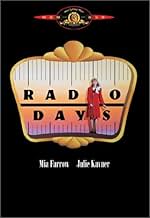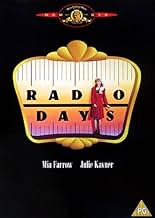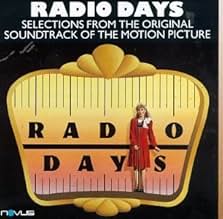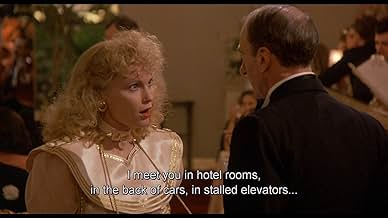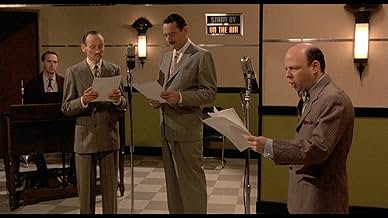Ein nostalgischer Rückblick auf das goldene Zeitalter des Radios, in dessen Mittelpunkt eine normale Familie und die verschiedenen Radiodarsteller stehen.Ein nostalgischer Rückblick auf das goldene Zeitalter des Radios, in dessen Mittelpunkt eine normale Familie und die verschiedenen Radiodarsteller stehen.Ein nostalgischer Rückblick auf das goldene Zeitalter des Radios, in dessen Mittelpunkt eine normale Familie und die verschiedenen Radiodarsteller stehen.
- Für 2 Oscars nominiert
- 3 Gewinne & 10 Nominierungen insgesamt
- Avenger Crook
- (as Michael Murray)
- Ceil
- (as Renee Lippin)
Empfohlene Bewertungen
What a beautiful, kind, gentle, ironic, warm, sentimental (in a very good way and yes, I am talking about Woody Allen's movie, that's right) yet perfectly balanced delight. It is a series of sketches about young Joe (young Allen, of course, played by Seth Green - that was a surprise), an adolescent in Brooklyn, NY during 1930s-1940s who was passionately in love with radio which was a king. The film is a tribute to the magical radio days and the myths and legends about radio personalities, the memory of a grown man who never forgot where he came from, the love letter to his always fighting and arguing ("I mean, how many people argue over oceans?") but loving relatives and a very funny comedy (the way only Allen's comedy can be). It is the film where pretty like a doll and painfully naive Sally (Mia Farrow) asks who Pearl Harbor is? Where gorgeous Diane Keaton sings and Diane Wiest, his beloved Aunt Bea never gives up hope of one true love. He never told us if she found it...
"I never forgot that New Year's Eve when Aunt Bea awakened me to watch 1944 come in. I've never forgotten any of those people or any of the voices we would hear on the radio. Though the truth is, with the passing of each New Year's Eve, those voices do seem to grow dimmer and dimmer."
The Radio days are gone but thanks to Allen, the voices of the times passed are still clear and sound and they always will be.
9/10
Set against long-forgotten radio programs, hit songs, and the coming of World War II, we get two narrative threads. The Rockaway family dealing with everyday issues in a series of vignettes, and the fictional life of Sally White (Mia Farrow) as she rises from cigarette girl to glittering radio star.
The cast is excellent. Farrow has a solid role as the Brooklyn girl with the Judy Holliday voice who battles her way toward upward mobility. Julie Kavner and Michael Tucker are terrific as the parents. Dianne Wiest is sweet as Aunt Bea, always on the lookout for true love. Seth Green plays Woody as a kid. Diane Keaton and Kitty Carlisle show up as singers. Josh Mostel and Renee Lippin are hilarious as the aunt and uncle. Wallace Shawn has a funny bit as the "Masked Avenger." Other notables include Richard Portnow as Si, Kenneth Mars as the rabbi, Larry David as the crazed neighbor, Jeff Daniels and William H. Macy as radio actors, Tony Roberts as the game show host, Danny Aiello as the gangster, and a special kudo for the hilarious Gina DeAngelis as his mother.
Highlights include Bea's date on the night of Orson Welles' famous radio program about a Martian invasion, and the poignant episode about the live radio coverage of a girl who's fallen down a well. The film also takes nostalgic looks at radio serials, quiz programs, and comedy shows.
The film perfectly captures the middle class neighborhood of Allen's youth. The interiors are beautifully done (Santo Loquasto), and very memorable is the awe-inspiring visit to Radio City Music Hall with its dimmed lights, lush carpets, and warm red-and-gold tones.
There is also a parade oh hit songs of the day that include "September Song," "Tico Tico," "Mairzy Doats," "South American Way," "Pistol Packin' Mama," "If I Didn't Care," and so many others.
A final word for the many actors and actresses in small parts who make this movie feel so right. Many have walk-ons or have only a line or two but they add the perfect touch and help recreate Woody Allen's beloved New York City.
Woody delivers a loving tribute to the concept of radio through the eyes of childhood. This has a large cast with wide ranging vignettes. It's imaginative, touching, and fun. The characters are specific and compelling. There is a terrific veneer of memory. Through all the surreal and the real, there is the love of family and radio that transcends the screen onto the audience.
I was anything but disappointed, but I knew what the film was all about before I saw it. Actually, what drew me to it was that I had read where this was a wonderful visual film, filled with rich colors and great set designs. It did not let me down. This is a great visual tribute to the 1940s, to be exact from 1938 to 1944. A real treat for the eyes.
The story centers around a Jewish family in Queens and the importance that radio shows had in that day-and-age. Also profiled in here are some of those radio performers.
It does have laughs but not as many as the normal Allen movie because the idea of this is simply to be a nostalgic piece, mainly Allen's tribute to his own family days of growing up, what it was like around his house.
It was interesting to see Seth Green playing Woody as a youngster with flaming red hair. The most interesting person, however, was Diane Wiest who played a man-chasing sister-in-law. The film gives you a real flavor of the period, of New York and of a Jewish family.
Overall, it's simply a nice film....and gorgeous to look at. Sometimes I think some of Allen's work is overrated but, boy, here is one that is definitely underrated.
Wusstest du schon
- WissenswertesThe story of Kirby Kyle, the ill-fated baseball player, is a parody of former Chicago White Sox pitcher Monty Stratton, whose promising career was derailed after he lost part of his leg due to a hunting accident. Stratton attempted a comeback and then retired. His life was made into a movie: The Stratton Story (1949).
- PatzerIn one scene, a pack of Camel cigarettes lies on a table, with a clearly visible bar code on the side of the package. The Universal Product Code would not be introduced until the 1970s.
- Zitate
[Last lines]
Narrator: I never forgot that New Year's Eve when Aunt Bea awakened me to watch 1944 come in. I've never forgotten any of those people or any of the voices we would hear on the radio. Though the truth is, with the passing of each New Year's Eve, those voices do seem to grow dimmer and dimmer.
- SoundtracksThe Flight of the Bumblebee
(1899-1900)
Music by Nikolai Rimsky-Korsakov
Performed by Harry James
Courtesy of CBS Records
Played during the opening credits
Top-Auswahl
Details
- Erscheinungsdatum
- Herkunftsland
- Offizieller Standort
- Sprachen
- Auch bekannt als
- Días de radio
- Drehorte
- Radio City Music Hall - 1260 6th Avenue, Rockefeller Center, Manhattan, New York City, New York, USA(Joe, his Aunt Bea and her date see a movie there)
- Produktionsfirmen
- Weitere beteiligte Unternehmen bei IMDbPro anzeigen
Box Office
- Budget
- 16.000.000 $ (geschätzt)
- Bruttoertrag in den USA und Kanada
- 14.792.779 $
- Eröffnungswochenende in den USA und in Kanada
- 1.522.423 $
- 1. Feb. 1987
- Weltweiter Bruttoertrag
- 14.792.779 $
Zu dieser Seite beitragen





